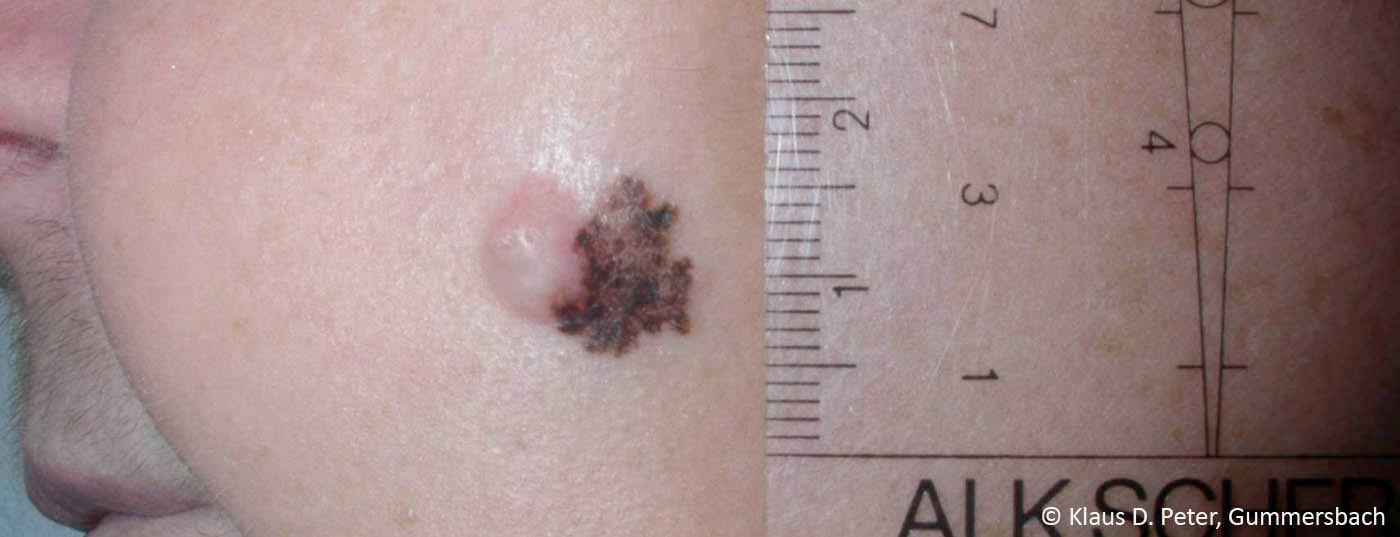There is news on the KEYNOTE-006 study evaluating pembrolizumab (Keytruda®) for the treatment of advanced melanoma. The study was terminated early after the defined endpoints consisting of progression-free and overall survival were met early. Specifically, pembrolizumab reduced mortality risk by more than 30% compared with ipilimumab.
Pembrolizumab is a humanized monoclonal antibody that blocks the interaction between PD-1 and its ligands (PD-L1/-L2). By binding to the PD-1 receptor, it prevents suppression of the immune response that occurs through the PD-1 pathway and stimulates the immune system to fight cancer cells.
The Phase III trial, called KEYNOTE-006, used the compound to treat unresectable advanced malignant melanoma (stage III or IV) and compared it to ipilimumab (anti-CTLA-4). Thus, two immunotherapies targeting different immune checkpoint signaling pathways faced each other. The 834 participating patients had not undergone more than one prior systemic therapy. They received either pembrolizumab 10 mg/kg every two weeks (n=279), every three weeks (n=277), or four cycles of ipilimumab 3 mg/kg every three weeks (n=278).
Premature end
The study was stopped early at the end of March 2015. This was due to the following results presented at the annual meeting of the American Association for Cancer Research and published in the New England Journal of Medicine [1]:
- One of the primary endpoints, progression-free survival (PFS), showed median values of 5.5 months (pembrolizumab every two weeks [a]), 4.1 months (every three weeks [b]), and 2.8 months (ipilimumab [c]). Overall, the risk of progression was significantly reduced by 42% with pembrolizumab compared with ipilimumab. At six months, the calculated PFS rates were 47.3% (a), 46,4% (b) resp. 26,5% (c).
- The 1-year overall survival rate (also primary endpoint) was 74.1% (a), 68,4% (b) and 58.2 (c), which corresponds to a significant mortality risk reduction of 37% resp. 31% corresponds.
- Secondary endpoints included overall response rate: it was 33.7% (a), 32,9% (b) and 11.9 (c); the difference from ipilimumab was significant for both pembrolizumab regimens. At the time of cutoff after an average of 7.9 months, response lasted in 89.4% (a), 96,7% (b) vs. 87.9 (c) of the patients.
- The safety and efficacy profiles of the two pembrolizumab regimens tested were comparable. KEYNOTE-001 and -002 had already shown that the two regimens at 10 mg/kg were equally effective and safe as the currently approved 2 mg/kg dose every three weeks.
- Overall, the safety profile of pembrolizumab was consistent with the SmPC: most common treatment-associated adverse events were fatigue, diarrhea, rash, and pruritus. Most common autoimmune or immune-associated side effects were hypo- and hyperthyroidism.
- Grade three and four adverse events occurred less frequently with pembrolizumab than with ipilimumab (in 13.3% [a], 10.1% [b] vs. 19.9% [c] of patients). Treatment discontinuations occurred more frequently with ipilimumab.
Indication extension
“Ultimately, the goal of any cancer trial is to prolong life, which in KEYNOTE-006 was even associated with a reduction in severe side effects,” said Caroline Robert, MD, Paris, lead author of the published article. Currently, pembrolizumab is approved in the U.S. following progression on ipilimumab. Based on the compelling data from KEYNOTE-006, the manufacturer now plans to file for approval for first-line treatment in advanced melanoma by mid-year.
Source: MSD media release (April 19, 2015).
Literature:
- Robert C, et al: Pembrolizumab versus ipilimumab in advanced melanoma. NEJM April 19, 2015. DOI: 10.1056/NEJMoa1503093.
InFo ONCOLOGY & HEMATOLOGY 2015; 3(5): 7.











